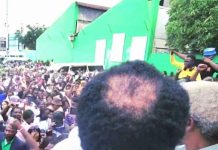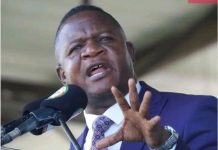Africa-Press – Zambia. Imagine a person suffering from a severely infected leg wound that has been neglected for an extended period. The wound is filthy, filled with pus and dead skin, and has caused immense pain and suffering.
After enduring this agony for too long, the individual finally decides to seek medical help. Upon arriving at the clinic, health personnel assess the damage and begin the painful process of cleaning the wound. They use sharp instruments and methylated spirit to remove the debris and damaged tissue. The patient cries out in pain during the procedure.
After the wound is cleaned and treated, they are given medication and sent home to recover. In time, the wound heals completely, and the patient, relieved of the pain, forgets both the wound and the doctor who treated it. This scenario is an apt metaphor for the economic situation in Zambia.
The United Party for National Development (UPND) government inherited a severely damaged economy from the Patriotic Front (PF) government led by Edgar Chagwa Lungu.
Under the PF administration, several key mines were closed, inflation skyrocketed from K5 per dollar to K21 within a decade, and public funds were misappropriated, leaving 20 million Zambians to suffer the consequences. Additionally, the PF government subsidized fuel without repayment, accumulating over $800 million in debt. Unemployment levels soared, and the overall economic landscape was bleak.
When the UPND government assumed power, it faced the daunting task of revitalizing an economy in shambles. Much like the medical team treating the neglected wound, the new administration had to make tough decisions to clean up the mess left behind. They started by aligning policies to rejuvenate the country’s economy, successfully improving growth from -2.7% to about 3.4%.
Removing the unsustainable fuel subsidies and addressing the accumulated arrears was a painful but necessary step. The New Dawn government also prioritized reopening closed mines like Mopani and anticipated the reopening of Konkola Copper Mine (KCM). Dewatering Shaft 28 and embarking on an ongoing debt restructuring process were also crucial measures.
This period of economic recovery has not been without its challenges. Zambia has faced droughts and rising fuel prices, exacerbating the difficulties and causing discontent among the populace.
Some citizens, feeling the immediate discomfort of these necessary reforms, have voiced concerns that the UPND government has failed to meet their expectations. They forget, much like the patient who no longer remembers their painful wound, that the current administration is in the process of cleaning up the extensive damage inflicted by the previous PF government.
Despite the pain and difficulties, these reforms are essential for long-term recovery and growth. The UPND government is focused on not just healing the economy but also creating a stable foundation for sustainable development. The reopening of mines and ongoing debt restructuring efforts are critical steps in this direction, promising a brighter future for Zambia’s economy.
In conclusion, just as a neglected wound requires painful but essential treatment to heal, Zambia’s economy is undergoing a necessary and painful recovery process.
The UPND government, like diligent health personnel, is committed to cleaning up the inherited mess, despite the immediate discomfort it causes. With continued efforts and perseverance, the wounds of the past will heal, leading to a healthier and more prosperous Zambia.
For More News And Analysis About Zambia Follow Africa-Press







